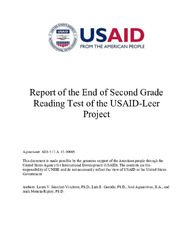Please use this identifier to cite or link to this item:
http://cris.unibe.edu.do/handle/123456789/39| Title: | Report of the End of Second Grade Reading Test of the USAID-Leer Project | Other Titles: | Proyecto USAID-Leer: Evaluación de fin de Segundo Grado [1er. año] | Autores: | Sánchez-Vincitore, Laura V. Garrido, Luis Eduardo Aguasvivas-Manzano, José Armando Mencía-Ripley, Aída |
Researchers (UNIBE): | Sánchez-Vincitore, Laura V. Garrido, Luis Eduardo Aguasvivas-Manzano, José Armando Mencía-Ripley, Aída |
Affiliations: | Laboratorio de Neurocognición y Psicofisiología (NEUROLAB) Decanato de Investigación e Innovación (DII) Decanato de Investigación e Innovación (DII) Decanato de Investigación e Innovación (DII) |
Research area: | Ciencias Sociales | Issue Date: | 2016 | Publisher: | Santo Domingo: Universidad Iberoamericana (UNIBE); United States Agency for International Development (USAID) | Project: | Lighting Excitement for Excellency in Reading (LEER) | Abstract: | End of Second Grade study consisted of a short evaluation to test three main literacy subskills (letter knowledge, correct words per minute, and reading comprehension) on a representative sample of Project-READ student. This study responds to Project READ’S Indicator 1.3: “Reporting a proportion of students who by the end of 2nd grade of primary schooling demonstrate that they can read and understand the meaning of grade leveled texts”. Participants showed 44 % accuracy on Letter Knowledge, 17 correct words per minute, 36 % accuracy on Reading Comprehension. When comparing these results to the Baseline study we found statistical significant difference on all measurements, with higher scores for the End of Second Grade Study. However, the effect sizes of each comparison were small. It is still premature to attribute the significant differences found here on Project-READ intervention, since this first year of intervention has been dedicated to getting to know the field, and no more than 3 very basic workshops with teachers, and some mentoring was conducted. In terms of indicator 1.3, 40% of second grade show evidence of understanding at least 50% of the meaning of grade leveled texts. Although these are encouraging results, participants studied here have not yet reached Fist-grade benchmark on early literacy skills. Project READ’s intervention should keep focused on Baseline recommendations, that include: (1) Explicit teaching of the alphabetic principle, (2) Instruction of phonological awareness, (2) Teaching of oral comprehension skills. |
Description: | This document is made possible by the generous support of the American people through the United States Agency for International Development (USAID). The contents are the responsibility of UNIBE and do not necessarily reflect the view of USAID or the United States Government. |
URI: | https://cris.unibe.edu.do/handle/123456789/39 |
| Appears in Collections: | Publicaciones del DII-UNIBE |
Files in This Item:
| File | Description | Size | Format | |
|---|---|---|---|---|
| Report of the End of Second Grade.pdf | Full text [open access] | 729.88 kB | Adobe PDF |  View/Open |
Google ScholarTM
Citations
Items in DSpace are protected by copyright, with all rights reserved, unless otherwise indicated.
